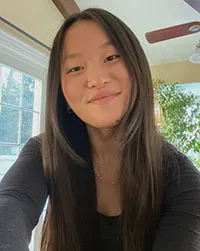Hip-Hop and Hong Kong: A Q&A with Sadie Buerker '22
Published February 17, 2022
By Tarika Pather '24

Sadie Buerker ‘22, a sociology major with a minor in global south development, is researching the use of Hip-Hop as protest music in contemporary Hong Kong. Her research is informed by her interest in Hip-Hop and the rise of the subcultural and defiantly subversive genre amid the growing political tension in the Asian city.
Sadie’s research is part of her fellowship in the Kahn Institute yearlong project Democracies Redux: Resumptions, Resilience, Reconciliation, and Restoration. As part of the project, each of the 15 fellows engages in their respective research with the assistance and collaboration of the other fellows.
“For young people, their first research project can be difficult,” noted Sadie. “Everyone goes on their own journey, and I think the Kahn is definitely a good space to have that first experience. It is a space in which you can see yourself as an independent, whole thinker.”
Sadie recently responded to questions about here Kahn experience.
KahnTact: Can you describe your Kahn research project?
Sadie Buerker: My project looks at the use of Hip-Hop as protest music in contemporary Hong Kong. I look a lot at how the artists have mobilized the genre as a tool for democratic participation. It’s very interesting because Hip-Hop isn’t necessarily a genre associated with Hong Kong. The rise of the genre there coincides with all of these underlying tensions among youth, and working-class people in particular, and Hip-Hop has become an outlet for them to express their thoughts and opinions. The biggest protests started in 2014, the Umbrella Movement, then 2019-20 saw huge protests. Because of the Internet, all music became something more accessible and more easily circulated. Cantonese rappers in the city have contributed to this rise, and because it’s subcultural there is a lot more space to be defiant.
KahnTact: What is your favorite part of working at the Kahn?
SB: My favorite part of the Kahn is the [weekly project] dinners. I really enjoy not only continuing conversations from the seminars, but also having the opportunity to communicate with faculty who are interested in hearing about students, and to learn about faculty and their experiences at Smith. Also, gaining insight into what students and faculty are concerned about. There are so few spaces where we get to experience this with faculty and students. It’s been so important during the pandemic to have these connections. And in general, research can be isolating. The game of trying to read everything within your field can create an environment that can be super-isolating and a lot of pressure. It’s important to have people there to support you and to engage with and talk about the research with. It’s also been helpful to see that professors struggle as well, to find time and motivation sometimes. It helps you feel less alone.
KahnTact: How has it been working in person at the Kahn this year?
SB: We’ve heard from past Kahn fellows, who had to conduct their fellowships virtually last year. They said that the best things about the Kahn – the conversations – are difficult over Zoom. On Zoom, it can be difficult to get the richness out of conversations, and you miss the dinners together, and everyone gets Zoom fatigue. After hearing those fellows’ perspectives, I’m very happy to be at the Kahn in person this year. At its heart, fellowship is being in a community with others and thinking and working with other people. The Kahn provides that. It is such a unique space on campus.
KahnTact: What advice would you give to Smith juniors and sophomores now interested in applying for a Kahn fellowship for next year?
SB: Number one: I’ve learned so much from people doing different things, the diversity of disciplines, like dance, art, music, history, study of women and gender, literature. Also, the food is awesome. But on the challenging side, there’s a certain hurdle you have to get over in terms of seeing yourself as a colleague among faculty and other students. And as a student you have lots of other jobs, and you’re struggling with managing four or five classes.
The Kahn is definitely a good space to have your first intense research experience, where you see yourself as an independent, whole thinker. Talk with and rely on other student fellows, too. Know that you’re not alone. The student fellows in my group have been really solid about, “I’ll have your back,” it’s been wonderful. Having a place like the Kahn is a great place to grow, to be in that growth-learning zone.